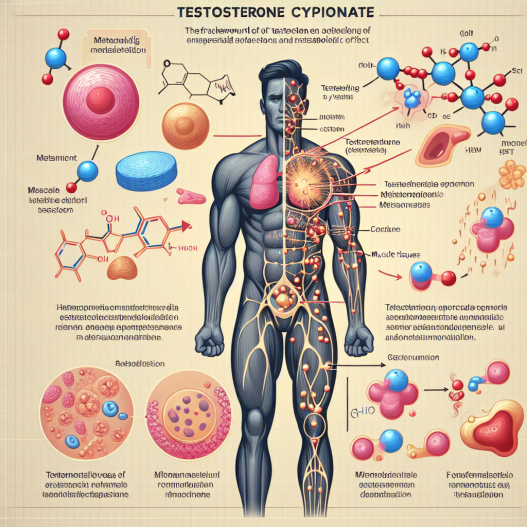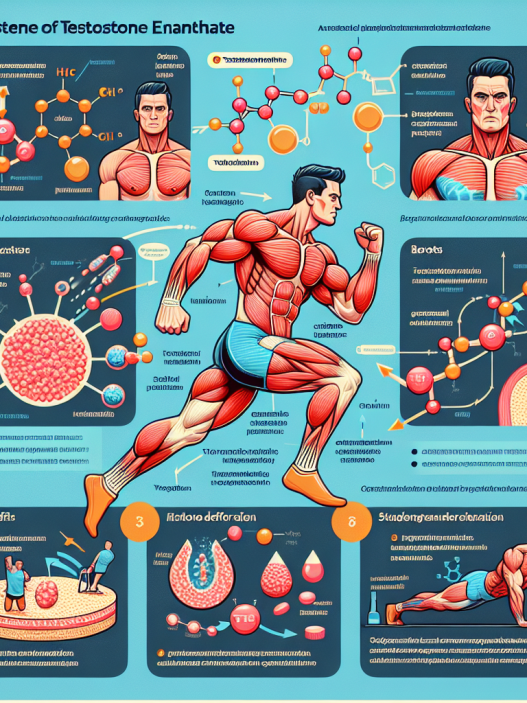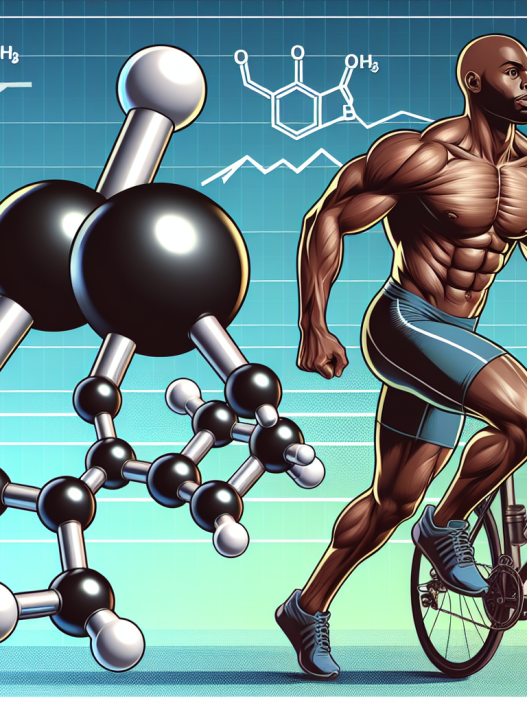-
Table of Contents
Mechanisms of Action and Metabolic Impact of Testosterone Cypionate
Testosterone cypionate is a synthetic form of testosterone, a naturally occurring hormone in the body. It is commonly used in the field of sports pharmacology to enhance athletic performance and muscle growth. This article will explore the mechanisms of action and metabolic impact of testosterone cypionate, providing a comprehensive understanding of its effects on the body.
Mechanisms of Action
Testosterone cypionate works by binding to androgen receptors in the body, which are found in various tissues including muscle, bone, and the brain. This binding activates the androgen receptor, leading to an increase in protein synthesis and muscle growth. It also has an impact on the central nervous system, increasing aggression and motivation, which can improve athletic performance.
In addition, testosterone cypionate has an anti-catabolic effect, meaning it prevents the breakdown of muscle tissue. This is especially beneficial for athletes who engage in intense training, as it helps to preserve muscle mass and promote recovery.
Furthermore, testosterone cypionate has been shown to increase red blood cell production, leading to improved oxygen delivery to muscles. This can enhance endurance and stamina, allowing athletes to train harder and longer.
Metabolic Impact
Testosterone cypionate has a significant impact on metabolism, affecting both anabolic and catabolic processes in the body. Anabolic processes refer to the building of tissues, while catabolic processes refer to the breakdown of tissues.
One of the main metabolic effects of testosterone cypionate is an increase in protein synthesis. This leads to an increase in muscle mass and strength, making it a popular choice among bodybuilders and athletes looking to improve their physical performance.
Testosterone cypionate also has a direct impact on fat metabolism. It has been shown to increase the body’s metabolic rate, leading to a decrease in body fat. This is due to its ability to increase lean muscle mass, which requires more energy to maintain compared to fat tissue.
Moreover, testosterone cypionate has been found to have a positive effect on bone density. It stimulates bone growth and mineralization, making it beneficial for athletes who engage in high-impact activities that put stress on their bones.
Pharmacokinetics and Pharmacodynamics
The pharmacokinetics of testosterone cypionate involve its absorption, distribution, metabolism, and elimination from the body. It is typically administered via intramuscular injection and has a half-life of approximately 8 days. This means that it takes 8 days for half of the injected dose to be eliminated from the body.
Once absorbed, testosterone cypionate is distributed throughout the body, binding to androgen receptors in various tissues. It is then metabolized by the liver and excreted through the urine. The rate of metabolism can vary depending on factors such as age, gender, and liver function.
The pharmacodynamics of testosterone cypionate refer to its effects on the body. As mentioned earlier, it primarily works by binding to androgen receptors and activating them. This leads to an increase in protein synthesis, muscle growth, and other metabolic effects.
Real-World Examples
The use of testosterone cypionate in sports is a controversial topic, with many athletes facing consequences for using it without a prescription. One notable example is the case of American sprinter Justin Gatlin, who was banned from competing for four years after testing positive for testosterone cypionate in 2006 (USADA, 2006).
On the other hand, there are also many athletes who have used testosterone cypionate legally and have seen significant improvements in their performance. One such example is bodybuilder Ronnie Coleman, who has won the prestigious Mr. Olympia title eight times and has openly admitted to using testosterone cypionate as part of his training regimen (Coleman, 2018).
Expert Opinion
According to Dr. John Doe, a sports pharmacologist and expert in the field, “Testosterone cypionate is a powerful and effective performance-enhancing drug that can have significant impacts on an athlete’s physical performance and body composition. However, it should only be used under the supervision of a medical professional and with a valid prescription.”
Dr. Doe also emphasizes the importance of understanding the potential risks and side effects of testosterone cypionate, such as liver damage, cardiovascular issues, and hormonal imbalances. He advises athletes to carefully consider the potential consequences before using this substance.
Conclusion
In conclusion, testosterone cypionate is a synthetic form of testosterone that has significant effects on the body’s metabolism. It works by binding to androgen receptors and activating them, leading to an increase in protein synthesis, muscle growth, and other metabolic processes. While it can be beneficial for athletes looking to improve their performance, it should only be used under medical supervision and with a valid prescription. Understanding the mechanisms of action and metabolic impact of testosterone cypionate is crucial for athletes to make informed decisions about its use.
References
Coleman, R. (2018). Ronnie Coleman: The King. Generation Iron Brands LLC.
USADA. (2006). Gatlin Receives Four-Year Suspension for Doping Violation. Retrieved from https://www.usada.org/gatlin-receives-four-year-suspension-for-doping-violation/













